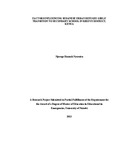| dc.description.abstract | This study aimed at investigating factors influencing Sudanese urban refugee
girls’ transition to secondary school in Kikuyu district, Kenya. The study sought
to achieve the following objectives: to determine the extent to which cultural
traditions influence Sudanese urban refugee girls’ transition to secondary school,
to examine the extent to which the parents’ level of education influence Sudanese
urban refugee girls’ transition to secondary school, to identify the extent to which
certification regulation by the government of Kenya influence the Sudanese urban
refugee girls transition to secondary school and to assess the extent to which
socio-economic background of a family influence Sudanese urban refugee girls
transition to secondary school in Kikuyu district. The study was carried out in 11
public primary schools and 6 public secondary schools in Kikuyu district. The
study used the descriptive survey design. Data was collected using questionnaires
and interview schedules. Purposive sampling was used to select the 11 primary
schools and 6 secondary schools with Sudanese urban refugee girls. Thirty three
secondary school teachers, 134 primary school teachers, 22 secondary school
urban refugee girls and 114 primary school urban refugee girls were randomly
selected to produce a sample size of 320 respondents. A pilot study was
conducted in two schools to validate the research tools. Data was collected, coded
and analyzed to form the basis for research findings, conclusions and
recommendations. The findings indicated that Sudanese traditions, parents’ level
of education, certification regulation policy and socio-economic background of a
family influence transition rate of girls to secondary schools: The study has made
a few recommendations. First, organizations dealing with refugees in Kenya
should network with the government and other stakeholders to sensitize urban
refugee parents on the need of educating their girl children. Secondly, the
UNHCR office in Nairobi should improve educational support for urban refugee
girls to ensure that they transit to secondary schools once they complete their
primary education. In addition, the UNHCR and the government of Kenya should
invest in the construction of boarding schools for urban refugee girls to curb the
problem of early marriage. Moreover, schools should include Sudanese urban
refugees in decision making, by for example, making them prefects and having
their parents/guardians as officials in the PTA. Finally, this study has made
suggestions for further research. These include the need to conduct a similar study
but for refugees of a different origin, a study on the same concept but focusing on
the urban refugee boy-child to determine whether the factors influencing their
transition to secondary schools are the same as those of urban refugee girls and a
study on transition of refugee girls in a camp based situation for comparative
purposes. | en |

